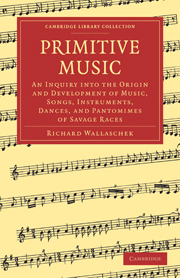 Primitive Music
Primitive Music Book contents
- Frontmatter
- PREFACE
- Contents
- CHAPTER I GENERAL CHARACTER OF THE MUSIC OF PRIMITIVE PEOPLE
- CHAPTER II SINGERS AND COMPOSERS IN PRIMITIVE TIMES
- CHAPTER III INSTRUMENTS
- CHAPTER IV THE BASIS OF OUR MUSICAL SYSTEM
- CHAPTER V PHYSICAL AND PSYCHICAL INFLUENCE OF MUSIC
- CHAPTER VI TEXT AND MUSIC
- CHAPTER VII DANCE AND MUSIC
- CHAPTER VIII PRIMITIVE DRAMA AND PANTOMIME
- CHAPTER IX ORIGIN OF MUSIC
- CHAPTER X HEREDITY AND DEVELOPMENT
- Summary
- List of quoted Authorities
- Index
- Plate section
CHAPTER VIII - PRIMITIVE DRAMA AND PANTOMIME
Published online by Cambridge University Press: 29 August 2010
- Frontmatter
- PREFACE
- Contents
- CHAPTER I GENERAL CHARACTER OF THE MUSIC OF PRIMITIVE PEOPLE
- CHAPTER II SINGERS AND COMPOSERS IN PRIMITIVE TIMES
- CHAPTER III INSTRUMENTS
- CHAPTER IV THE BASIS OF OUR MUSICAL SYSTEM
- CHAPTER V PHYSICAL AND PSYCHICAL INFLUENCE OF MUSIC
- CHAPTER VI TEXT AND MUSIC
- CHAPTER VII DANCE AND MUSIC
- CHAPTER VIII PRIMITIVE DRAMA AND PANTOMIME
- CHAPTER IX ORIGIN OF MUSIC
- CHAPTER X HEREDITY AND DEVELOPMENT
- Summary
- List of quoted Authorities
- Index
- Plate section
Summary
We have seen in the former chapters how intimately music and dancing are connected. Primitive dances have in the most cases a special meaning: they have to represent something and have therefore a position among the other arts quite different from the modern dances. At such representations no words are spoken, but mimicry and gestures are not less a language, far better fitted to explain the action than the primitive language of words. These pantomimes, as we may call them, are indeed a primitive drama, and as music is always connected with dances one may judge how great the importance was that music had on these occasions. Dramatic music, or musical drama, if you like, is not an occasional union of two different arts, it is originally one organism, and at the same time the earliest manifestation of human art in general. Therefore, Richard Wagner's artistic genius again correctly denned the essential character of the drama when he said: “Long before the epic songs of Homer had become a matter of literary concern they had flourished among the people as actually represented works of art, supported by the voice and gesture, so to speak, as concentrated, fixed, lyric, dancing songs (“verdichtete, gefestigte, lyrische Gesangstänze”), in which the poets' fondness of resting with the description of the action and the repetition of heroic dialogues prevailed”.
Information
- Type
- Chapter
- Information
- Primitive MusicAn Inquiry into the Origin and Development of Music, Songs, Instruments, Dances, and Pantomimes of Savage Races, pp. 214 - 229Publisher: Cambridge University PressPrint publication year: 2009First published in: 1893